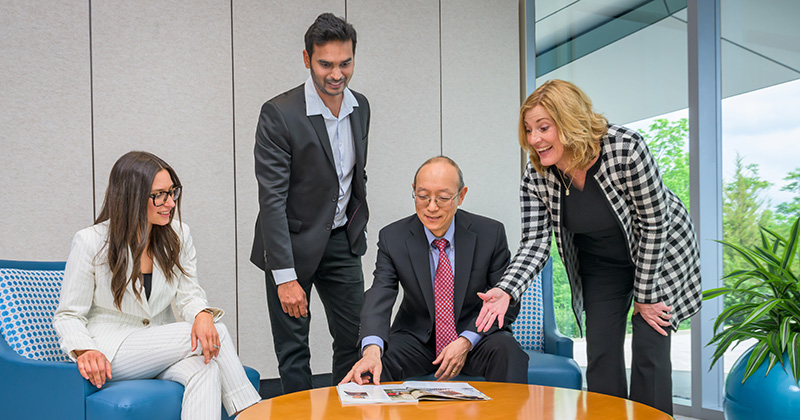


Learning to navigate turbulent times with UD PCS’ PocketMBA
Photo by Evan Krape July 16, 2025
Empowering innovation through strategic competitive intelligence
Developing a drug that significantly improves patients’ lives and meets their medical needs can take 10 to 15 years. In the fiercely competitive and complex process of bringing a new drug to market, Incyte — an innovative global biopharmaceutical company based in Wilmington, Delaware — must proactively prepare for the next wave of innovative treatments.
To tackle this challenge, Tom (Qingjiu) Tao, assistant professor of management at the University of Delaware’s Alfred Lerner College of Business and Economics, has designed a customized nine-month scenario planning exercise to empower Incyte teams to navigate the intricate landscape of drug development and launch, all within the framework of UD’s Division of Professional and Continuing Studies (UD PCS) PocketMBA program.
Tao, the director of the PocketMBA program, considers the ability to gather, analyze and use information to make strategic business decisions a core capability for any company.
"People participating in our program want to bring good things to this world. To achieve that, a company must be a learning organization,” he said. “The individuals who work at Incyte are a diverse group of smart, dedicated people, genuinely interested in addressing unmet medical needs and making meaningful contributions. Their commitment to continuous learning and growth is part of what drives their success."
To help participants integrate competitive intelligence as an essential business practice and foster a mindset and culture focused on understanding the competitive landscape, forecasting potential futures and generating actionable insights, Tao and Incyte teams identified four plausible future scenarios based on two critical uncertainties in drug development.
In these distinct scenarios, teams of participants were challenged to make strategic, data-driven recommendations in response to various potential Food and Drug Administration (FDA) actions, competitor moves, industry developments and fluctuations in the economy and investment landscape. They had to consider significant factors in each context, including designing and implementing inclusive clinical trials, ensuring treatment safety and affordability, nurturing exceptional talent and adapting to global health trends — all while striving to streamline research and development (R&D) and production timelines to deliver urgently needed precision medicine as swiftly as possible. The teams included more than 50 employees from every aspect of the company’s operations across the United States and Canada.
"The strategic planning project pushed us out of our comfort zone, far beyond what a typical case study would,” said Pamella Galluzzi de Castro, senior manager of strategic sourcing, who develops sourcing strategies and maintains supply chains for the company. “We engaged in multiple discussions and considered the many different viewpoints of our colleagues, which was incredibly constructive, and it challenged our assumptions.”
The collaboration with colleagues outside her daily scope proved to be enlightening for Carrie LaGreca, associate director of external manufacturing, as well. She found that the strategic planning project broadened her perspective on overall business operations, helping her understand how different aspects of the company function and why certain decisions are made.
"It was incredibly valuable to gain this broader view beyond my focus on manufacturing," she said.
Grace Wong, director of medical affairs at Incyte Canada, leads her team in forming scientific and research partnerships to enhance patient care and advance Incyte's scientific goals.
"The course is incredibly useful because it covers a wide range of topics and includes hands-on strategic exercises,” she said. “The group project challenged us to consider how drug development must adapt to a changing landscape beyond our daily tasks. These insights are highly relevant to our ongoing efforts to create impactful solutions that improve patient outcomes."
Learning how to lead in a competitive healthcare environment is also a vital component of this PocketMBA program. Instructor Rita Landgraf, professor of practice and distinguished health services administrator at UD, helps participants identify strategies to enhance their leadership capacity.
“The PocketMBA program incorporates evidence-based research, practical strategies and engagement with a diverse group of faculty and professionals,” Landgraf said. “Witnessing the final scenario project presented by individual cross-departmental teams was truly exciting. It was evident that participants not only gained valuable knowledge in leadership and strategic planning but also cultivated strong relationships to advance Incyte's mission.”
The PocketMBA program embodies UD PCS’ commitment to equipping professionals with the skills necessary to excel in dynamic business environments. By integrating competitive intelligence analytics and fostering essential soft skills, the program prepares participants to navigate and lead in rapidly evolving fields.
"The ability to anticipate and adapt to future challenges is crucial for success,” Tao said. “Our PocketMBA program is designed to instill these capabilities, ensuring that professionals are prepared not only for today's demands but are also ready to drive innovation and growth in the future."
Learn more about the UD PCS PocketMBA at pcs.udel.edu/customized/capabilities.
Contact Us
Have a UDaily story idea?
Contact us at ocm@udel.edu
Members of the press
Contact us at mediarelations@udel.edu or visit the Media Relations website

